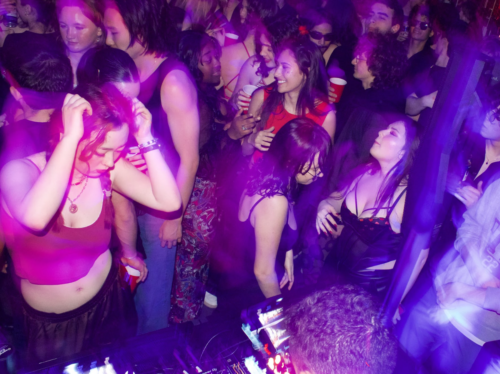Although Harvard students might disagree about many things, it seems like they all can agree on one: Harvard parties suck. Pre-game in a dorm. Go to a function with mediocre music. Eat Jefe’s or Joe’s. For a school filled with extraordinary talent and people, going out is often an unremarkable experience.
Yet one group on campus is breaking this narrative. Reverb, Harvard University’s premier electronic music collective, has begun to spice up Harvard’s nightlife. Throwing parties featuring talented student DJs, Reverb is infusing Harvard with a new energy and vibrancy. Instead of hearing the same old party soundtracks, Harvard students are vibing to pulsating beats, dancing to innovative soundscapes, and letting loose.
Reverb was launched in the fall of 2022. Since then, the group’s popularity has skyrocketed. This school year, they have sold out all of their events, including “Welcome to the Jungle,” “2001: Bass Odyssey” in December, and most recently, “Sin City.” The founders and executive board members Dylan Rhee ’25, Rick Zhou ’25, Hanna Pak ’24, Robert Escudero ’24, and Alexios Stavropoulos ’24 have made it their mission to bring electronic music to campus.
“We didn’t really like the fact that every single Harvard party would play the same Top 40 songs, and there was no party experience that was really centered around music,” co-founder Rhee explained.
In addition to DJ-ing, Rhee produces his own electronic music. Electronic music is a wide genre encompassing any music that is digitally made with computers and synthesizers. A popular type of electronic music is EDM (electronic dance music). Reverb experiments with a wide variety of subgenres, from dubstep, to house, to techno.
“We all wanted to share our passion for electronic music… The problem was we also couldn’t find people, and there was really no opportunity for us to find them because there was no community that existed at Harvard,” Rhee said.
At Reverb’s most recent party, “Sin City,” tickets sold out in less than 48 hours. For just $5, students danced to a curated lineup running from 9:30 P.M. to 2 A.M. featuring four Harvard undergraduate DJs and an open bar. The cutting-edge sound system, high-quality lighting, and visual effects transformed the Currier Ten-Man suite into a nightclub-reminiscent venue.
As the night progressed, Reverb’s tech and deep house music entranced the crowd. Washed in a kaleidoscope of red, purple, and blue, the dimly lit suite pulsated with infectious energy. Instead of the awkward “small talk-mingle-chug drink” cycle, bodies swayed and danced, every individual was letting loose to the thumping bass.
“It takes a lot of time to find music and to try and create a vibe and work the crowd,” co-director Stavropoulos said. Stavropoulos, stage name Alexios, captured the crowd with his signature deep tech style. Notably, his remix of Sammy Virji’s “Sinking Sailor” filled the room with laughter and synchronized movement. Rhee added, “There’s a big misconception that the DJ is basically just a glorified jukebox.” At Sin City, however, it was clear that every beat was crafted with care to build up the party’s atmosphere.
The stereotype around Harvard students is that they do not know how to have fun. They are too uptight. They are too serious. They are too studious. “I think the recipe for a really good party is…you’re there to hear new stuff to meet new people. That’s what the whole point is—new experiences,” states co-director Escudero. This new philosophy is proving that Harvard students want to, and are able to, have a lot of fun.
“There’s something to be said about losing yourself in the music… If you don’t know the lyrics, you don’t know the song, you’re really listening. And you find yourself within what’s almost like a visual or spatial field.” From Auckland, New Zealand, Zhou, a co-founder, has brought the international popularity of house music to Cambridge. Since Reverb’s inception, there has been overwhelming positive feedback. “We’re focusing on the spring for now… We’re gonna try our best to put on really cool experiences.”
Co-Director Hanna Pak explained, “I think one of the goals of Reverb is to make a more inclusive party space but that’s not just like the same music.” Harvard’s party culture is unique compared to other universities. Besides dorm parties or parties hosted by student organizations, final clubs dominate the social scene. With Reverb, “There’s just no exclusivity from it. Whoever gets tickets gets tickets,” says Stavropoulos. Reverb is focused on bringing fun for all. “My entire life goal just boils down to wanting people to have fun because of things that I am doing,” Pak added. Rhee also provided insightful context about what it feels like to put on these events. “The goal is to make [the crowd] hear songs that make them really dance…, but they also think, ‘Oh, I didn’t know that I liked this before, or what is this song?’ That’s the best moment.”
Selling out with 185 attendees at Sin City, Reverb hopes to continue to heighten its reach and elevate its events to a greater scale. “It’s a grind for sure,” Rhee concluded. “It’s a huge time commitment. We never count the hours. We just get lost in it.” As for the popularity of electronic music at Harvard, it seems to be only growing. “I think it’s been a really pleasant surprise how responsive people are to music they don’t know they like,” Pak said.
Reverb is redefining what it means to party. With an open mind, it is clear that Harvard students are eager to shape a more dynamic and exciting night culture on campus.
Kaitlyn Hou ’27 (kaitlynhou@college.harvard.edu) thinks that listening to house music while studying is almost like being at an actual party…almost.

